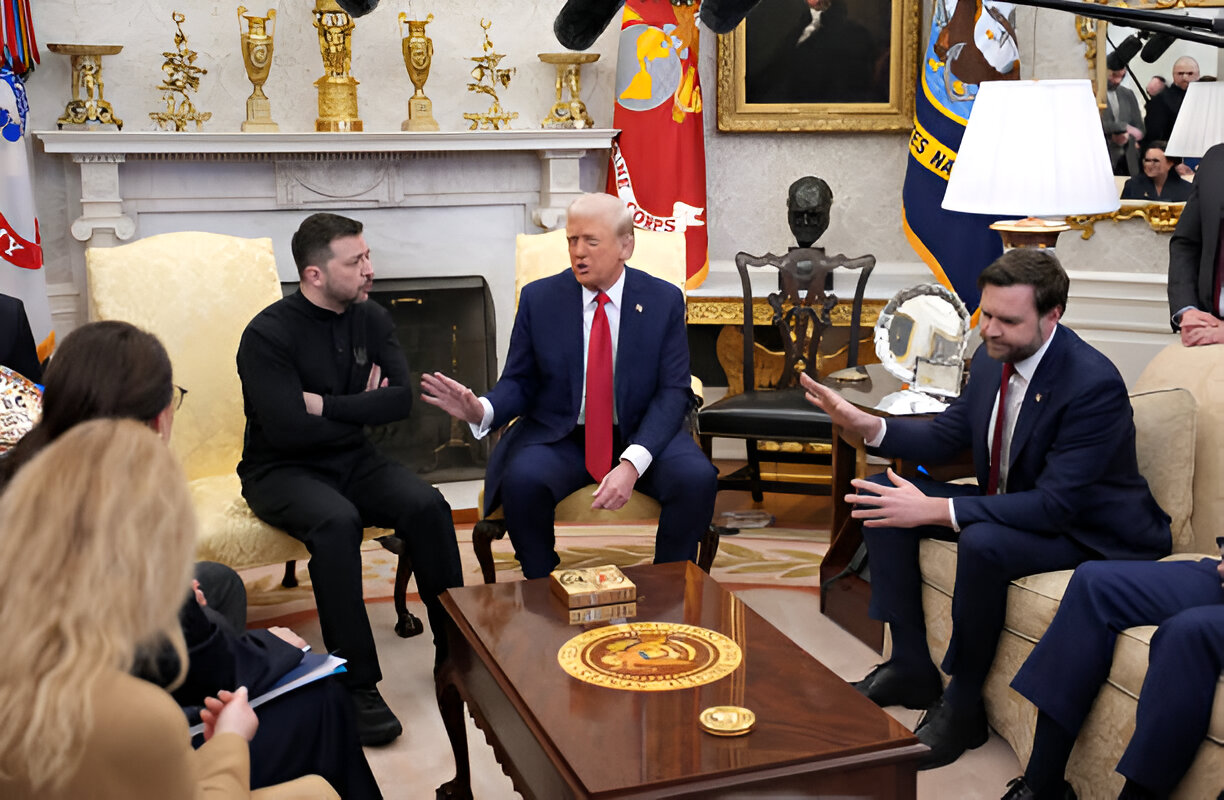The recent treatment of Ukrainian President Volodymyr Zelenskyy in the Oval Office has brought a sharp focus on JD Vance’s troubling stance towards Ukraine. Vance, best known for his memoir Hillbilly Elegy, has become a key figure in the growing populist movement in the United States. His recent remarks in Munich, questioning the rationale behind defending Europe’s liberal democracies from Russian aggression, have drawn the ire of many who see the ongoing war in Ukraine as a direct challenge to the security of the entire continent.
Vance’s comments, which cast doubt on the need for Western support for Ukraine, have sparked alarm in countries neighbouring Russia—where the threat of Russian aggression is no abstract political concern but an existential crisis. For them, the conflict is not about political theory, but the stark reality of potentially being wiped off the map by an expansionist Russia.
But Vance’s position is not just a misstep in diplomatic rhetoric; it reflects a much deeper and more troubling ideological shift. For many, particularly in central and eastern Europe, Vance’s narrative is not simply about a personal history marked by hardship and struggle in America’s rust belt. It’s about a broader political philosophy that promotes the principle of “might is right.” This doctrine, grounded in an increasingly cynical view of international relations, sees power as the ultimate arbiter of morality. For Vance and his allies, smaller nations—like Ukraine—simply do not have the right to self-determination or the moral support of larger, more powerful countries.
This worldview is disheartening, particularly given the progress made in central and eastern Europe since the end of the Cold War. Nations that once suffered under the yoke of Soviet communism—countries that were politically and economically ravaged by decades of authoritarian rule—are now proud members of the European Union and NATO. Their transformation from oppressed, struggling states to confident democracies is a testament to the power of international solidarity and mutual support.
It’s worth remembering that these countries weren’t simply liberated overnight; their journey involved immense effort and struggle. As they rebuilt from the rubble of communism, their vision was clear: they sought democratic sovereignty and the opportunity to embrace modernity and economic prosperity. In doing so, they set out on a path to “westernisation,” not simply as a political project, but as a deeply emotional and moral commitment to joining a Europe defined by freedom, democracy, and human rights.
Yet today, as Russian tanks roll across Ukraine’s borders, the commitment of many in the West to these ideals is beginning to fray. The political divide within the Western world is becoming increasingly evident, with countries like Hungary and Slovakia, influenced by figures like Vance and former U.S. President Donald Trump, aligning themselves with a populist, anti-democratic camp. Meanwhile, nations that once sought to join the “west” are now urging solidarity with Ukraine, recognising that the same forces threatening Ukraine’s sovereignty also jeopardise the very values they have worked so hard to build.
The shift in Europe’s geopolitical landscape is profound. Poland, the Baltic States, and other countries on Russia’s doorstep have long understood the stakes. They have, for years, invested heavily in defence, preparing for the possibility of a Russian assault. The anxiety of living with such a threat is palpable and, in many cases, has defined national policies. Yet, this fear is not simply a reflexive response to Russia’s actions. It stems from a genuine understanding that a failure to defend Ukraine is, in essence, a failure to defend European security as a whole.
At the same time, figures like French President Emmanuel Macron and UK Labour Leader Keir Starmer are starting to understand Ukraine’s position more fully. Their commitment to standing with Ukraine, at great cost, represents a recognition that solidarity is not just a matter of moral high ground, but of strategic self-interest. As a result, the EU’s centre of gravity is shifting. The leadership of Poland, the Baltic States, and other countries on the frontlines of Russian aggression is now helping to shape the direction of European foreign policy.
However, the situation is far from uniform. In Germany, for example, the far-right Alternative für Deutschland (AfD) party has gained significant traction, buoyed by figures like Vance who are sympathetic to their anti-democratic agenda. This faction of the political right represents the populist, “might is right” school of thought that dismisses the importance of constitutionalism and international law. The growing influence of such forces in Europe, coupled with Vance’s vocal support, highlights the deepening rift within the Western alliance.
In this new bifurcated world, there are two competing “wests.” One, represented by Vance, Trump, and their allies, is based on a cynical view of power, where the strong impose their will on the weak. The other, exemplified by those who support Ukraine’s right to exist and thrive as a sovereign nation, remains committed to the values of democracy, human rights, and international solidarity.
Vance’s treatment of Zelenskyy—his belittling and dismissive approach to Ukraine’s struggle—symbolises this shift. His rhetoric and actions suggest that the historical lessons learned from the Cold War, the values of democracy and freedom that helped rebuild post-communist Europe, are increasingly at odds with the new political forces rising on both sides of the Atlantic.
In the end, Vance’s views are less about the trauma of his past and more about the ideological framework he now represents—a framework that is increasingly out of step with the values of liberal democracy and solidarity that defined the post-Cold War order. As Europe faces a renewed existential threat from Russia, the question is whether the West can hold together, or whether it will fracture into competing visions of power and might.






